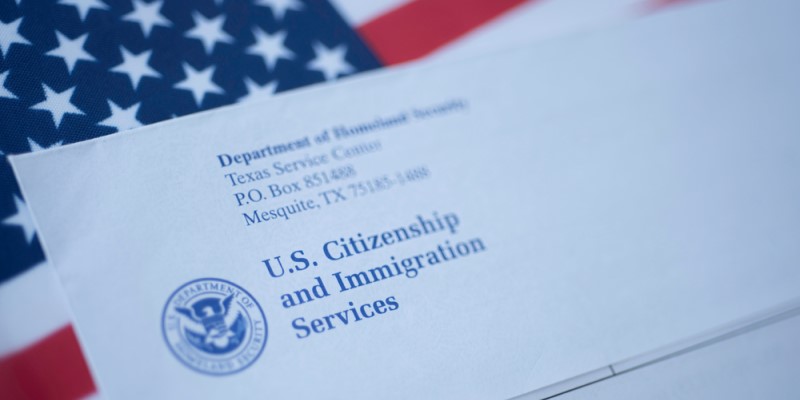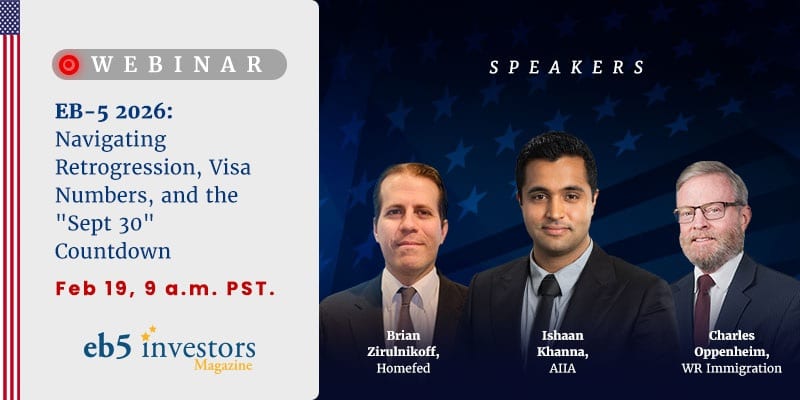
By Anayat Durrani
The EB-5 Reform and Integrity Act of 2022 (RIA) brought with it several changes to the way Regional Centers (RCs) operate. Among these changes was the new Form I-956G, originally released in June 2022 by the U.S. Citizenship and Immigration Services (USCIS) along with its accompanying instructional manual. In late August 2023, the USCIS released an updated version of Form I-956G.
Form I-956G is a document submitted to the USCIS by Regional Centers that seek continued designation under the EB-5 Visa Program. The form is required to be filed by approved Regional Centers so that the USCIS can evaluate their effectiveness and compliance with EB-5 program requirements.
“USCIS-designated Regional Centers must file this form before December 29, 2023, of the calendar year when the fiscal year ends,” says Dennis Tristani, managing attorney for Tristani Law, LLC. “Form I-965G is the post-RIA version of the Form I-924A.”
While the new Form I-956G serves a similar purpose as I-924A, it has some significant differences and requires the submission of more documents.
“Specifically, the new Form I-956G asks for a complete accounting of how the EB-5 funds were used in the EB-5 project,” says Jennifer Hermansky, shareholder at Greenberg Traurig, LLP. “The Form I-956G requires the submission of evidence as to the flow of funds from the NCE [‘New Commercial Enterprise] into the JCE [Job Creating Enterprise].”
Hermansky says the form asks for detailed evidence on the progress of the EB-5 project, the aggregate quantity of direct jobs created, and an in-depth accounting of all fees paid by EB-5 investors to third parties such as administrative and management fees, commissions, or other transaction-based compensation.
“Moreover, the Form I-956G seeks to collect information on the ‘separate accounts’ for banking of the NCE and JCE, as well as information about the Fund Administrator,” says Hermansky. It also requires regional centers to disclose any litigation and bankruptcy proceedings. Failure to file Form I-956G on time for each federal fiscal year in which the regional center has been designated to participate in the EB-5 Regional Center Program can result in sanctions, including the regional center’s designation being terminated.
“Prior to the Regional Center program lapse in 2021, Form I-924A, Annual Certification of Regional Center was used to establish promotion of economic growth in compliance with the program,” says Greg Sheehan, director of EB-5 Investment Platform and USCIS Compliance for Behring Co. “Now USCIS requires Form I-956G, Regional Center Annual Statement to establish promotion of economic growth and to certify compliance with broader post-RIA integrity policies related to securities law, litigation reporting, fees collected, and labor laws.”
Some uncertainties remain about I-956G filing requirements and deadlines
Per USCIS’s Form I-956G instructions, only regional centers with federal designation during the reporting fiscal year or prior must file Form I-956G, says Alison Li, an associate attorney at Klasko Immigration Law Partners, LLP.
“It is arguably unclear, as of today, whether regional centers that received federal designation before the enactment of the Integrity Act but did not file or receive approval on a Form I-956 Application for Regional Center Designation, still need to file Form I-956G each year,” says Li.
The attorney notes that on December 23, 2022, USCIS suspended the deadline for filing the I-956G Form for Fiscal Year 2022 that was previously set for December 29, 2022. She adds the USCIS has provided no additional guidance except stating that they plan to publish guidance in the future. With only days before the end of Fiscal Year 2023, Li says, “it is still unclear whether filing of the I-956G for Fiscal Year 2022 is ever required.”
In the updated I-956G form and its instructional manual, Li notes that page 4 of the Form I-956G instructions states that Regional Centers are to complete Attachment 1 for each NCE and Capital Investment Project that involves “active EB-5 investors” during the applicable reporting period.
In accordance with USCIS guidelines, she explains that the term “active EB-5 investors” refers to “those who are seeking classification under INA [Immigration and Nationality Act] 203(b)(5) or who have obtained conditional permanent resident status and not yet filed for removal of conditions.”
“In other words, all projects that have investors who have filed an I-526/I-526E, and/or investors who have become conditional permanent residents but have not filed their I-829 petitions during fiscal year 2022, must file Attachment 1 by December 29, 2023, to report project information,” says Li.
She notes that this is a significant change from the Form I-956G instructions for Fiscal Year 2022 that required filing Attachment 1 only if a project had filed an I-956F.
“Attachment 1 requires a project to report a lot of information, including without limitation: an accounting of EB-5 investor capital investment; evidence showing EB-5 investors’ investment capital has been committed to the project, project progress, and job creation; fund administration and escrow account information; material change occurred in the preceding fiscal year,” says Li.
Why filing Form I-956G on time is important for EB-5 regional centers
Meanwhile, Hermansky says regional centers, NCEs, and JCEs will need to prepare much more detailed information than before, and the annual compliance process should begin early to allow for adequate preparation time.
Considering the increased reporting requirements this year, Li says her firm strongly encourages regional centers to start preparations for filing Form I-956G as soon as possible.
“We suggest that all previously approved regional centers should file an I-956G, regardless of whether they have filed an I-956 or I-956F after the enactment of the Integrity Act. This is because Form I-956G is essential for regional centers to maintain compliance and retain investors’ confidence,” says Li. “More importantly, a lot of the information requested on the Form I-956G will be required for investors’ I-829 filing anyway.”
She says records for bank, job creation, and taxes may not be available once beyond the document retention period and adds that it is crucial to stay up to date with recordkeeping.
“Regional Centers have an increased burden to provide this information timely to USCIS in order to maintain their status with USCIS and comply with new RIA requirements,” says Tristani. “Compliance is incredibly important to ensure the individual investor’s I-526E petitions are not negatively affected by a Regional Center’s lapse in status or potential termination.”
Sheehan says that because the Immigrant Investor Program Office (IPO) is currently taking actions on post-RIA set-aside filings in the rural and high unemployment area categories, active Regional Centers will be working with petitioner’s attorneys to report FY 2023 activity, ending September 30, prior to December 29, 2023.
“In addition, Regional Centers will be reporting more than just filing activity, and this will involve setting up time with securities counsel and other third-party vendors in order to certify compliance with the increased integrity requirements,” says Sheehan.
DISCLAIMER: The views expressed in this article are solely the views of the author and do not necessarily represent the views of the publisher, its employees. or its affiliates. The information found on this website is intended to be general information; it is not legal or financial advice. Specific legal or financial advice can only be given by a licensed professional with full knowledge of all the facts and circumstances of your particular situation. You should seek consultation with legal, immigration, and financial experts prior to participating in the EB-5 program Posting a question on this website does not create an attorney-client relationship. All questions you post will be available to the public; do not include confidential information in your question.








